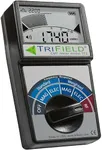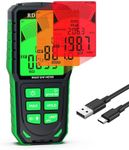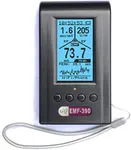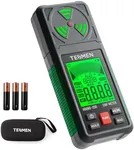Buying Guide for the Best Emf Meters
When choosing an EMF (Electromagnetic Field) meter, it's important to understand the key specifications and features that will help you find the best fit for your needs. EMF meters are used to measure electromagnetic fields, which can be emitted by various electronic devices and power lines. Knowing what to look for in an EMF meter will ensure you get accurate readings and the functionality you need for your specific application, whether it's for personal safety, professional use, or scientific research.Frequency RangeThe frequency range of an EMF meter indicates the range of electromagnetic frequencies it can detect. This is important because different sources of EMF emit at different frequencies. For example, power lines typically emit at 50-60 Hz, while wireless devices like Wi-Fi and cell phones operate at much higher frequencies. If you need to measure EMF from a variety of sources, look for a meter with a wide frequency range. For general home use, a range that covers 50 Hz to 3 GHz is usually sufficient. For more specialized applications, such as industrial or scientific use, you may need a meter with an even broader range.
SensitivitySensitivity refers to the meter's ability to detect low levels of electromagnetic fields. This is crucial if you need to measure weak EMF signals or if you are concerned about low-level exposure. Sensitivity is often measured in microteslas (µT) or milligauss (mG). For general use, a sensitivity of 0.1 µT or 1 mG is typically adequate. If you need to detect very low levels of EMF, look for a meter with higher sensitivity, such as 0.01 µT or 0.1 mG.
Type of EMF DetectedEMF meters can detect different types of electromagnetic fields, including electric fields, magnetic fields, and radiofrequency (RF) fields. It's important to choose a meter that can detect the type of EMF you are concerned about. For example, if you are worried about exposure from power lines, you will need a meter that can detect magnetic fields. If you are concerned about wireless devices, you will need a meter that can detect RF fields. Some meters can detect multiple types of EMF, which can be useful for comprehensive assessments.
Display and ReadoutThe display and readout of an EMF meter show the measured values and other relevant information. A clear, easy-to-read display is important for accurately interpreting the readings. Look for a meter with a digital display that shows the EMF levels in units you are comfortable with, such as microteslas or milligauss. Some meters also offer additional features like backlighting for use in low-light conditions, or graphical displays that show trends over time. Consider your specific needs and how you will be using the meter when evaluating the display options.
Data Logging and ConnectivityData logging and connectivity features allow you to record and transfer EMF measurements for further analysis. This can be particularly useful for professional or scientific applications where you need to track EMF levels over time or across different locations. Some meters come with built-in memory for storing readings, while others offer connectivity options like USB or Bluetooth for transferring data to a computer or mobile device. If you need to keep detailed records of your measurements, look for a meter with robust data logging and connectivity features.
Calibration and AccuracyCalibration and accuracy are critical for ensuring that your EMF meter provides reliable measurements. Calibration refers to the process of adjusting the meter to ensure its readings are accurate. Some meters come pre-calibrated from the factory, while others may require periodic calibration. Accuracy is typically expressed as a percentage, indicating how close the meter's readings are to the true EMF levels. For most applications, an accuracy of ±5% is sufficient. If you need highly precise measurements, look for a meter with higher accuracy and consider whether it can be easily recalibrated.
Portability and DurabilityPortability and durability are important considerations, especially if you need to use the EMF meter in different locations or in challenging environments. A portable meter should be lightweight and easy to carry, with a design that allows for one-handed operation. Durability is also important, particularly if you will be using the meter outdoors or in industrial settings. Look for a meter with a rugged design, possibly with water and dust resistance, to ensure it can withstand the conditions in which you will be using it.




















